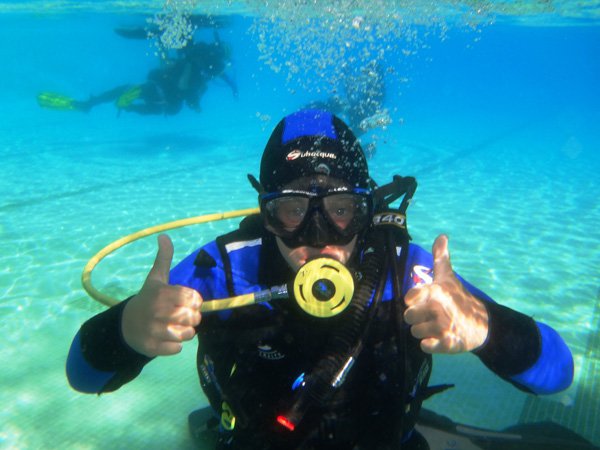Foot Odor Prevention and Treatment
DOES YOUR SKATING STINK OR IS IT YOUR FEET?
When you come home from skating does your family make you take off your skates in the back yard? Will they do ANYTHING to keep you from doing it in the car? If you are like most people, your feet do not smell their best after a hard workout (my feet, of course, smell lovely all the time).
This can be an embarrassing problem, but it is completely normal and natural for perspiration, dead skin cells, and bacteria to cause some degree of foot odor. In most cases odor problems are preventable, and when they are not preventable they are almost always treatable.
Try These Things First Foot odor is usually caused by bacteria, and the only way to really get rid of it, is to get rid of the bacteria. An even better strategy is to prevent the bacteria from growing in the first place. Products like charcoal-impregnated insoles are not really that helpful, because they do not get rid of the source of the problem. Here are some things that will help:
- Wash your feet thoroughly every day, with a good antibacterial soap. Scrub them hard with a wash cloth or body brush to remove all of the dead skin cells. Take extra care to scrub the area between your toes.
- Dry your feet immediately after bathing, especially between your toes. Some people use a hair dryer to make sure their feet are completely dry.
- Change your socks frequently, especially when you are exercising.
- Whenever possible, do not wear the same shoes two days in a row. Try to let your shoes dry out 1 or 2 days between wearings. (it would be best to do this for skates too, but not many people can afford to buy 3 pairs of good skates!)
- Sprinkle talcum powder or one of the commercial foot powders (which sometimes ARE talcum powder) into the toes of your socks to help keep your feet dry and discourage the growth of bacteria. Some people like to use baking soda, but others say it feels gritty against their skin.
- If you believe your feet perspire excessively, you can rub an underarm antiperspirant into your feet to help them stay dry. If it contains Aluminum Chlorohydrate it will be even more effective, but wash it off right away if it starts to irritate your feet.
- If none of these things work, you can try applying a 5% or 10% solution of Benzoyl Peroxide gel to your feet, to decrease bacteria growth.
More Ideas
- Soak your feet every day, in a solution of black tea and cool water. Some people believe the tannin in the tea has a deodorizing effect, and they believe it makes the sweat glands shut down temporarily.
HOW TO DO IT: Brew 2 tea bags in 2 cups (1 pint) of boiling water for 15 minutes. Add the tea to 2 quarts of cool water, and soak your feet for 20 to 30 minutes. To convert these measurement units to metric units, see Converters for International Skaters.
- Some people take zinc supplements to prevent foot odor, because they believe foot odor can be a sign of zinc deficiency. Get your doctor's opinion before you try this, and ask for a dosage recommendation, so you don't take a toxic amount.
- Some people drink diluted liquid chlorophyll to prevent foot odor, because chlorophyll deodorizes other parts of the body, inside and out. Check with your doctor before trying this, because chlorophyll can have side effects.
Treatment for Severe Problems If you have a very serious sweating problem (called hyperhydrosis) or a very serious foot odor problem (called bromohydrosis) your doctor may suggest that you try one of these treatments:
Aluminum Chloride with Ethyl Alcohol This medication is more commonly known by the brand name Drysol? It is very effective, but it can cause skin irritation. Most doctors will tell you to apply it at night and wash it off completely the following morning.
Prescription Antibiotics If you have a very difficult foot odor problem, your doctor may want to prescribe an antibiotic like 2% Erythromycin or 1% Clindamycin, applied each morning and at at bedtime. These medications will be effective in killing most odor-causing bacteria. (IMPORTANT NOTE: Using antibiotics should be avoided whenever possible. Frequent use can make them ineffective, because the bacteria will develop a resistance to that particular antibiotic).
Gluataraldehyde This is the main ingredient in many sun-free tanning products. It will stain your feet brown, but it can be effective in reducing excessive perspiration, when applied to the bottom of the feet in a 2% to 10% solution.
Acetic Acid Foot Baths Acetic acid foot baths can be effective in drying up sweat glands, if treatments are given 3 times per day.
Electrode Therapy This treatment is called iontophoresis. The feet are immersed in a pan of water and 15 or 20 mA of electric current is applied. Iontophoresis is not a cure for excessive sweating, but it usually provides temporary relief, if applied frequently. It works by "injecting" electronically charged ions into the skin, causing the sweat glands to shut down temporarily.
Botulism Injections Injecting tiny amounts of botulism toxin into the sweat glands under the skin can sometimes dry up those glands for several months. Up to 20 injections may be needed, but the treatment will work for up to nine months. This treatment is similar to the botulism injections used by cosmetic surgeons to decrease the appearance of wrinkles on the skin.
Surgical Solutions Surgery is the solution of last resort, but for a very small minority, it is the only thing that works. The two most common procedures are (1) blocking the nerve that causes sweating, and (2) complete removal of the sweat glands. IMPORTANT NOTE: The nerves related to foot sweating are not all located near the feet, and nerve blocking surgery for excessive foot perspiration can have unexpected side effects. Ask your doctor about these!
Summary The vast majority of foot perspiration and odor problems can be effectively treated with simple home remedies. I organized this article with the most effective and safest home treatments first, and the most drastic and radical treatments at the end. If you have a problem with excessive foot odor, you can be sure that relief IS available. Try some of these suggestions, and work with your doctor, to find the solution that works best for you!


